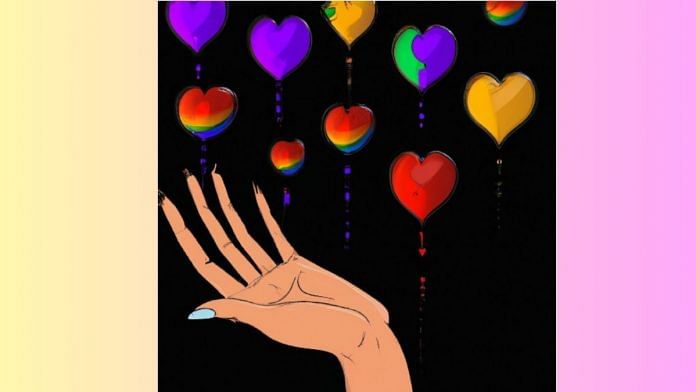
Thank you dear subscribers, we are overwhelmed with your response.
Your Turn is a unique section from ThePrint featuring points of view from its subscribers. If you are a subscriber, have a point of view, please send it to us. If not, do subscribe here: https://theprint.in/subscribe/
In the global discourse on marriage equality, the recognition of same-sex unions has emerged as a significant topic of debate and social change. This includes India, a diverse and progressive nation that values equal rights. It is crucial for India to introspect and evaluate its commitment to inclusivity by considering the legalization of same-sex marriage. Love knows no boundaries, and extending marriage equality to all citizens, irrespective of sexual orientation, would be a powerful affirmation of equal rights in the country.
The path to legalizing same-sex marriage is complex, influenced by social, cultural, and legal changes. Historically, marriage has been defined as a heterosexual union deeply rooted in social, cultural, and religious norms, while same-sex relationships have faced stigma and discrimination. The global movement for legalizing same-sex marriage gained momentum in the late 20th century, starting with the Netherlands in 2001. This set a precedent for other countries to follow, promoting equality and human rights. In the United States, landmark Supreme Court rulings like United States v. Windsor in 2013 and Obergefell v. Hodges in 2015 affirmed the constitutional right of same-sex couples to marry, reflecting global progress towards marriage equality. In India, attitudes towards same-sex relationships and marriage have undergone significant changes. Previously taboo, same-sex relationships were decriminalized in 2018 by a landmark Supreme Court ruling that recognized the fundamental rights and dignity of LGBTQ+ individuals. This decision opened the door to discussions on legalizing same-sex marriage and ensuring equal rights for all.
Marriage extends beyond love; it represents a commitment to sh`aring lives and building a future together. Denying legal recognition and protections to same-sex couples undermines their fundamental rights and principles of equal citizenship. Recognizing same-sex marriage aligns with constitutional rights, ensuring equality, family formation, and protection against discrimination. It grants LGBTQ+ individuals the same rights, benefits, and protections as heterosexual couples, fostering stability and strengthening families. This recognition promotes social cohesion, combats discrimination, and affirms love’s boundless nature. Furthermore, legalizing same-sex marriage brings economic benefits by attracting global couples, stimulating tourism, boosting local economies, and attracting diversity-minded businesses and investors, positioning India as a progressive nation.
Opposition to same-sex marriage arises from religious and cultural beliefs, concerns about health, children’s well-being, and the preservation of traditional family structures. However, it is crucial to differentiate between religious beliefs and civil rights. Legalizing same-sex marriage does not impede religious freedom but rather guarantees equal rights and protections for all individuals, irrespective of their beliefs. Upholding secular principles entails safeguarding the rights of all citizens, regardless of sexual orientation. Additionally, these concerns can be addressed and should not justify denying same-sex couples the right to marry.
Firstly, legalizing same-sex marriage does not diminish the institution of marriage. It expands the definition to include the love and commitment shared by same-sex couples without undermining the importance of heterosexual marriages. Recognizing and respecting diverse relationships reflects the evolving nature of society. Secondly, extensive research consistently shows that children raised by same-sex couples thrive emotionally, cognitively, and socially. Studies comparing them to children raised in heterosexual households reveal no significant differences in psychological adjustment, gender identity, or sexual orientation. Parental love and support, irrespective of sexual orientation, are crucial for children’s well-being. Thirdly, embracing same-sex marriage does not erode traditional family values. Families come in different forms, and what matters most is the love and commitment within them. Same-sex marriage upholds principles of love, respect, and equality that are essential to any healthy family dynamic. Lastly, concerns about health in relation to same-sex marriages are often unfounded. The risk of STIs exists in all types of relationships and depends on individual behavior. Safe sex practices should be promoted regardless of sexual orientation. Research consistently shows that mental health outcomes for same-sex couples are comparable to those of heterosexual couples, with societal stigma and discrimination being the main contributors to mental health issues.
In conclusion, legalizing same-sex marriage in India aligns with the nation’s aspirations of becoming a global leader. It allows India to demonstrate its commitment to inclusivity, human rights, and equality for all. By granting equal rights to same-sex couples, India sends a powerful message about its respect for diversity and its role in promoting social progress. As other countries have already embraced same-sex marriage, India has the opportunity to join the global movement for marriage equality, contributing to ongoing conversations about LGBTQ+ rights and setting an example for other nations. By recognizing that love knows no boundaries and that every individual deserves equal rights and dignity, India fosters a society that embraces diversity, upholds human rights, and paves the way for a more inclusive future. Embracing marriage equality positions India at the forefront of social progress, promoting the well-being and happiness of all citizens, regardless of sexual orientation.
These pieces are being published as they have been received – they have not been edited/fact-checked by ThePrint.

COMMENTS